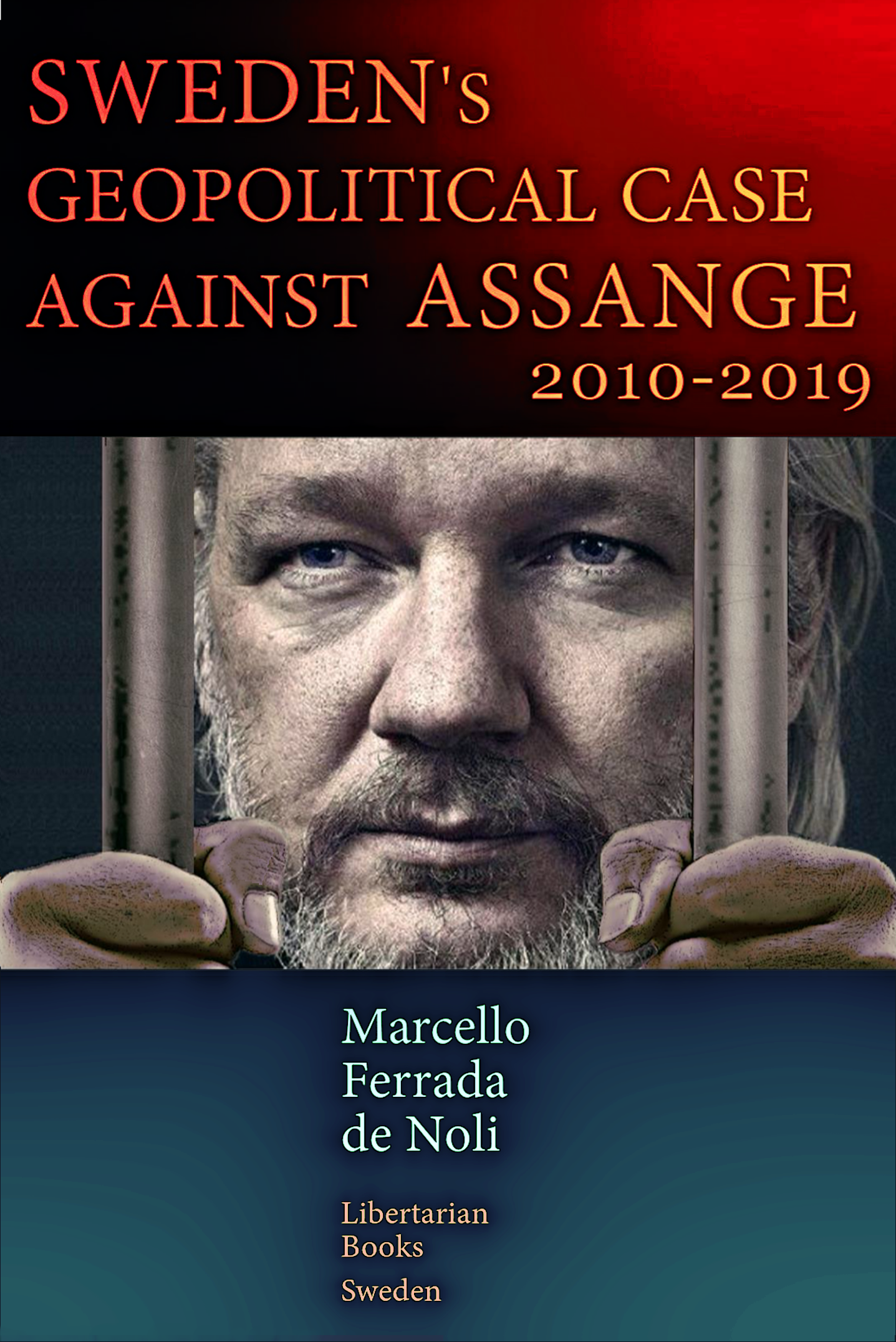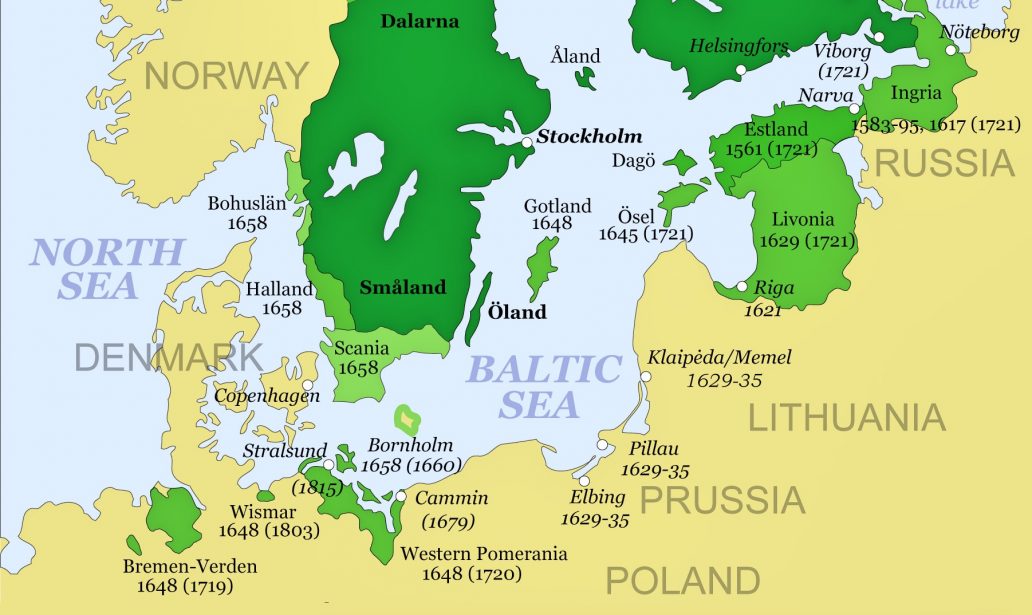By Prof. Marcelo Ferrada de Noli
Chair, Swedish Professors and Doctors for Human Rights SWEDHR
On Carl Bildt’s vision regarding “Sweden should be a superpower” –Is the Baltic Region a target for Sweden geopolitical desires? This is the second background article preceding my upcoming paper on allegations of interference by NATO Intelligence operations via Swedish “Russia experts” –e.g. Martin Kragh– that may compromise the national security of Sweden and the Nordic countries.
The government of Per Albin Hansson, his Social Democratic Party and the parties that composed the national coalition, were no ideologically Nazi, in spite that the German Nazi project had widespread sympathies in Sweden. But it was not that ideological factor the reason why they helped Hitler.
So, what was the real reason for the Swedes helping Hitler’s Germany in the way and volume they did –in spite of proclaiming to be a neutral country?
The government of Stefan Löfven, his Social Democratic Party and all the parties that compose the current government coalition, are no supporters of US President Trump, and they often utter derogatory expressions on him. In fact, Sweden is in the top of the list of European countries that disapprove Trump. Yet, Sweden has been increasingly helping NATO in the post-cold-war era –in spite of proclaiming to be a neutral country…In addition, as the former Swedish ambassador to Russia Seven Hirdman stated, “Sweden is now characterized as one of the most anti-Russian states in Europe along with Poland and Lithuania.”
the government of Sweden maintains the harshest stance against Russia among the European countries –only paralleled with Poland and Estpnia.
Would the then, and the current (and the future) governments of Sweden have a main common geopolitical reason that explains a similar geopolitical behaviour? Or is it else?
An explanation at hand would be “to help the enemy of my enemy”. And this would require at least one of these three premises:
- that Sweden would be objectively in potential geopolitical conflict with Russia, and thus preparing to be ready for a new one.
- that Swedes would subjectively consider Russia as an “enemy”,
- that “enemy” or “not-enemy”, Swedes have a “bad feeling” on Russians due to idiosyncratic, historical, or simply primitive prejudice or ignorance (which often goes together).
Premise A
Sweden has a quite long history of wars with Russia already since the 12th century. Yet, a relevant background information should not consist only of the prolific number of recurrent wars that Sweden and Russia have fought. It should also be attended to the cause of the wars, and their results in terms of the geopolitical consequences of each of them –which in its turn gave origin to yet repeated confrontations.
The last four wars resulted in Sweden’s defeats, and ultimately the destruction of the Swedish empire: [33]
|
It should be reminded that in Sweden, at the Swedish Institute of International Affairs –organization financed by the Foreign Ministry of Sweden and the Swedish Civil Contingencies Agency (MSB) –Russia is reported of also been founded by Swedes. This is what the site informs about Russia’s origins as a state:
“The first state formation in what later became Russian territory occurred in the 11th century BC in Central Asia, the Caucasus and the Black Sea. In the 850s AD, the eastern Slavic state of Kiev was founded, and in Novgorod (Holmgård), Swedish Vikings under Rurik formed another centre of power (Gårdarike). Since Kiev also ended up under the [rule of] the Ruriks, the kingdom grew, and in the late 900s it was Christianized by missionaries from Byzantium (Östrom). However, it was weakened and divided as a result of power struggles, and invaded by Mongols in the middle of the 13th century, which turned the Russian princes into vassals under the khans of the Golden Horde.” [32]
This information is also linked in the official site of the Government of Sweden / Foreign Ministry with information on Russia.
Classically viewed, geopolitics has to do with geographic issues pertinent to the interests of each country. It appears evident from the history of the Sweden-Russian wars, that the geopolitical interest of Sweden on the Baltic region has been clearly a chronic casus belli.
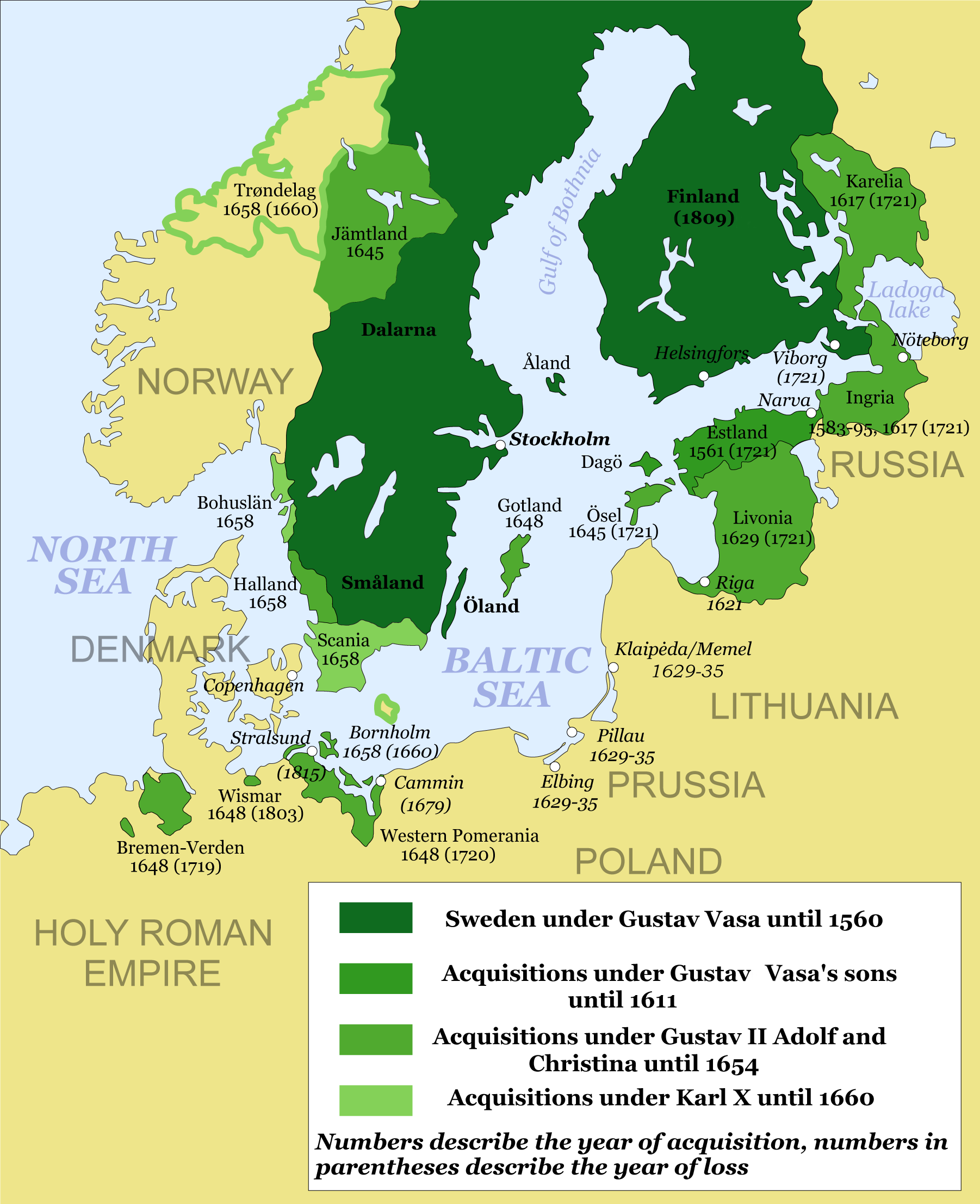
The Swedish Empire. The years in parenthesis indicate when Sweden lost the respective possessions. Chart from Wikimedia Commons.
And historically viewed, the big picture that emerges is that Sweden’s role in those wars has not consisted in a solely defensive endeavour against a “Russian aggression”. On the contrary, we see that Sweden has at times also initiated them.
So, the question is whether there is more than nostalgia, when demonstrators around Karl XII statue gather yearly, every end of November, at Kunstregården in central Stockholm. One main feature in the statue, is that his left hand points in the direction of Russia, while he grips his sword with the other hand.
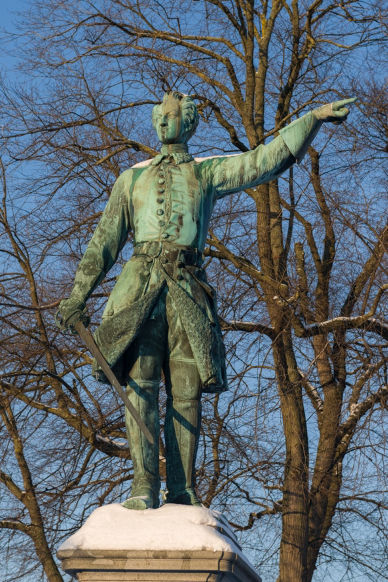
Most interesting, the Swedish mainstream media have revealed that then Foreign Minister Carl Bildt –according to the Stratfor emails exposures done by WikiLeaks– would be pursuing for Sweden the status of a new superpower. A member of the European Parliament who is reported being “very close to Carl Bildt”, emerges as the source of the information contained in the email correspondence. [34]
Bildt’s denials aside, the issue might deserve some interest, attending to the political situation now developing in Sweden –where the national-conservative Sweden Democrats are emerging as the party with largest popular support among Swedes.
The Sweden Democrats Party (SD) has been categorized on the right of the traditional right-wing Moderates, and quite often in the Swedish media –whose editorial teams are dominated by right-wing liberals– the Swedish remind the public of SD’s the Nazi roots. Others, including PM Löfven, describe SD as a “neo-fascist” [nyfascist] political party [35] [36].
The Sweden Democrats are in December 2019 ranked the largest political party in popular support. The (formerly centre-left) Social Democratic Party is now relegated to the second place in the polls. The difference in the results between the two parties, as shown in the last poll of 7 December 2019, is of only one percent.
Against the backdrop of Sweden’s Baltic history discussed above, the point being here that SD strongly advocates for the preservation and revival of historical and cultural heritages of Sweden.
Being the most outspoken nationalist party of Sweden, they intend to increase the military budget up to 2,5 percent of the BNP within the next years. They declare that partnership with NATO increase cooperation for international interventions (“insatser”). SD oppose the EU armed forces project “because it would create a parallel capacity to NATO” – as it stands in a SD statement on defence policy.
Whether Sweden would like or need to adventure armed confrontation to regain control of some sectors of the Baltic area in its vicinity remains largely far-fetched, or at the very least questionable. Sweden is already deeply engaged in investments, finance, etc., in Baltic countries.
Sweden also has been a main promoter of diplomatic initiatives aimed to bring Baltic countries in a common international front. These initiatives also comprise Ukraine, even before the putsch that Sweden helped to sponsor in that country, together with the US.
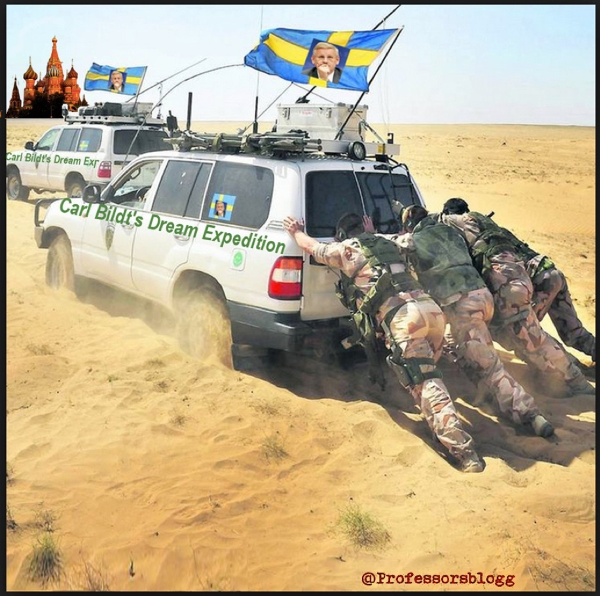
On Georgia, Bildt’s interferences included threaten Russia’s decision to recognize South Osettia as “clear and conscious crime against international law and will have long-term consequences.”
As the EU would perceive Sweden’s pan-Baltic manoeuvres as splitting, or divisive, some elites are considering further consolidating of those ties with Sweden via NATO –which entails enrollment to the Atlantic organization.
Premise B
This premise –that Swedes would subjectively consider Russia as an “enemy”– is in the actual case an understatement.
In fact, the Swedish defence minister Peter Hultqvist, or the Chief commander of the Sweden’s Armed forces Micael Bydén, show no restrain in publicly repeating over and over again, with exact terms, all along recent years the mantra meaning that Russia is the only identified thinkable aggressor in the Baltic scenario, relevant for Sweden’s national security.
“What the deterioration of the [Sweden’s] national security is about, it is about the Russian behaviour, an illegal annexation of Crimea, East Ukraine operations” [37]
Preposterously, not a mention is made by Bildt/Hultqvist/Bydén –and not a single comment in the Swedish media– that both the retaking of Crimea as well the rebellion in East Ukraine (initiated by Ukranian ethnic-Russians), followed the Ukrainian putsch actively sponsored by Sweden and the US.
Not a word that an immediate consequence of the new anti-Russian junta in Ukraine –substantially helped diplomatic and economically by Sweden– was the increasing presence of US forces in Ukraine territory, and therefore NATO’s ring around Russia tightened closer.
The hypothesis of a “thinkable scenario” in which would be instead NATO the power having plans to use the territory of neutral Sweden, airfields, etc., to facilitate an attack to Russia is not discussed at all in Sweden –although it has been discussed in the US.
Premise C
Premise c is about “feelings”. But, would it be possible that nowadays, entering the second decade of this century, “feelings” may determine which country to dislike –or even hate to the level of wishing to go to war against?
The military genius Carl Von Clausewitz, as I announced at the beginning of this introduction, after studying wars and armed conflicts past and contemporary of his epoch, concluded that yes, feelings may play a determinant role.
Particularly if the feeling agent is poorly equipped with reason, culture and knowledge.
Racism is a feeling, a culturally develop feeling. And in those same terms, other phobias, being those ethnic-based, or social based, or aesthetics based, share the same psychological mechanism of insufficiency than racism.
In this discourse, I should add that the problem may become endemic when persons in position of power (those who have access to communication with the masses via the state or corporate media) utter their phobic “feelings” publicly, and these attitudes might be taken as a model-to-follow.
When the phobia becomes a mode, everybody wish to have it.
Some examples of the above:
Ulf Adelsohn –an ex Communications Minister and then Carl Bildt’s boss at the right-wing party “The Moderates”– opposed the international boycott against the South African apartheid regime. He stated that such boycott from the part of the Swedes would cause the “poor niggers be left without work” [”de stackars negrerna annars skulle stå utan jobb”]. [38]
When Adelsohn was later asked by the TT News agency, whether he regretted to have used such deleterious terms, Adelsohn replied:
Why, “a nigger is a nigger and a Swede is a Swede” [38] [39]
Ensuing, TT News agency asked Carl Bild for a comment on the above declarations of Adehlson, to which Bildt replied:
“It is absolutely correct what Adelsohn said, one can certainly
also say that a Swede is a Swede and a Jude is a Jude” [40]
Nevertheless, this remarkable debate followed on Twitter:
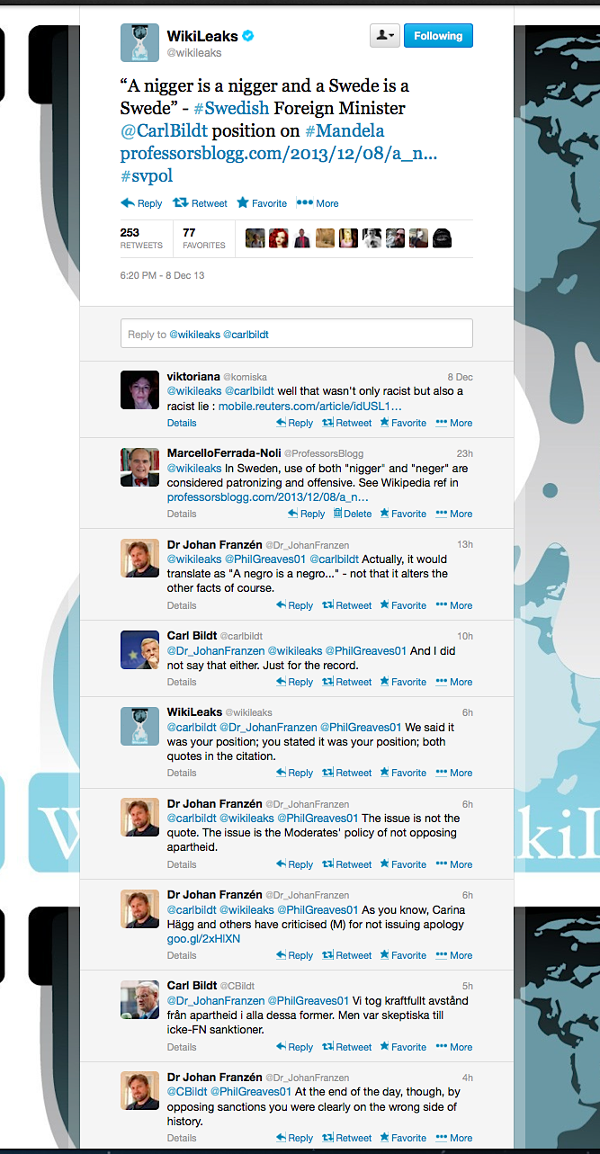
Secondly, independently of subjective appraisals about how “enemy” would Sweden consider Russia?
A qualified answer can only refer to the Swedish elites of the post Olof Palme era. Not to the Swedish people at large [see the next section]. And in the elites are included government, politicians, the military establishment and mainstream media.
And my answer is:
A number of voices among so called influencing Swedish elites, predominantly among MSM journalists and politicians with clear NATO sympathies have demonstrated aversion against Russia in their statements and commentary. And even if in a read between the lines, or of expressions, one can sometimes perceive a certain envy about Russia, or resent about the fact that Russia has recovered its superpower status, those elites would not recognize that publicly.
To the above has to be added the systematic disinformation in Sweden by agents either directly employed by NATO or at NATO-associated agencies e.g. Atlantic Council, etc. (or at UK and US directly sponsored ones, such as “Integrity Initiative”), or as journalist or academics at Swedish media or/and academic or research institutions disguising such ties. Some of these organizations receive public funds.
Not to mention the Swedish section of Amnesty International and other NGO’s financed by the government.
In contrast, SWEDHR is totally independent and receives neither financing aid nor sponsoring or directives from nowhere.
The activities above discussed are regarded as politically correct in Sweden, since even governmental agencies happily participate in the numerous “contra-propaganda (“Russian”) initiatives that have inundated Europe in recent years –specifically in the EU after the allegations of “Russian intervention” in the US and EU elections.
One should keep in mind that Sweden is the one leading country in the EU trying to keep, or make harder, the economic sanctions against Russia.
And that is Sweden, as mentioned, the country that have taken the initiative of organizing the Baltic countries, Poland, Ukraine, in a political front opposing Russia’s interests.
Sweden, Carl Bildt in particular, was a pivotal actor in the Ukrainian putsch that instituted a Junta, then including fascist members –all of them identified by a strong anti-Russian sentiment.
In a speech delivered at students in Ukraine, Carl Bildt, ex PM and long-time Foreign Minister of Sweden, declared outspokenly his anti, hyper negative feelings on Russia. Swedish newspaper DN did catch his expressions in this headline:
“I have always been proud about of being anti-Soviet” [41]
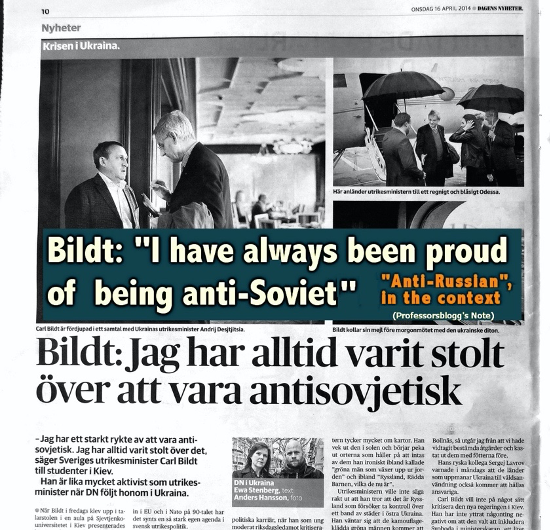
Furthermore, the Swedish state Tv and mainstream media refer to the government of Russia, and occasionally to the Russian people and their habits and traditions, in derogatory terms, or aggressive terms, and offensive terms.
The Swedish defence minister Hulqvist, as well as superior ranks in the military, do not miss an occasion to utter provocative statements about Russia, and specifically the direct blaming on Russia, to whom Sweden presents to the public as the cause in the security deterioration of the Baltic region.
Nowadays it is not any longer a Carl Bild’s monopoly.
For instance, in December 2013 it was known that the FRA –the Swedish version of the NSA (in fact, working for the NSA)– has been a conspicuously an active part of Quantum, and hacked on Quatum’s behalf. [42]
Prof. Wilhelm Agrell, a Swedish Conflict-science scholar, issued then this warning in an interview:
Quantum is “an American system for data penetration which is very much advanced. If used offensive against another country, it can be considered as an act of war by the country-target”. [43] [44]
The Assange case as instrument in the NATO deal
Considering the geopolitical issues discussed above, at this point we can preliminary identify the following:
- Either the geopolitics of Sweden aim to a purely defensive strategy, as it has officially been indicated.
- Or it primarily wishes to serve an aspiration of greater influence in the Baltic region.
- Or it is a combination of all the above.
- Or the geopolitics of Sweden is just a piece in a macro geopolitical design, and whose objectives are not decided by Sweden. (About this alternative, an example of it would be the participation of Swedish forces under US military command in Afghanistan, in which, at the most, Sweden may have decisions on the amount and quality of the contribution they are able to provide –but not on the strategic geopolitical decisions of the US, where own specific economic interests are comprised in the geopolitical appraisal).
In the first cases (1, 2, and 3), Sweden would have historically identified Russia as the archenemy.
That’s the problem. For the strategic comparisons, including military capability, between Russia and Sweden during the centuries that allocated the twelve Sweden-Russo wars. cannot possibly be applied today.
Added to the fact that during the cold war, when the Soviet Union was –for the period– qualitatively more powerful than today’s Russia, Sweden was never threatened, leave alone attacked.
The miscalculation of the Swedish elites in considering abandoning the stance of non-alignment, and deserting the vestiges of formal neutrality that were left from the Erlander/Palme era, is so absolute. And being so against the interest of the Swedish people, the survival of the Swedish people, that it invites to the conclusion that is the case of alternative 4, as above: just a piece in a macro geopolitical design which is not Sweden’s, neither in the interest of Sweden.
Because for structural reasons of military-power deficits, added historical experiences in geopolitical issues –but also because the majority of the Swedish people would not likely to approve it (say the polls)– Swedish elites cannot afford to confront public opinion and manoeuvre more open towards NATO membership.
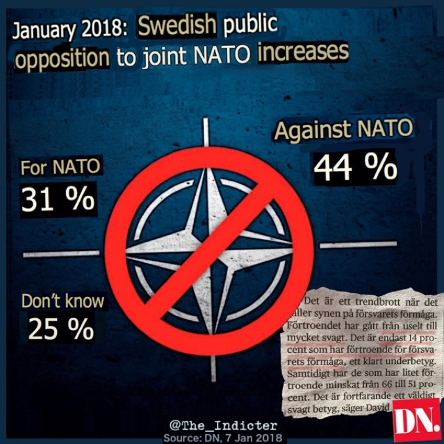
This naturally conveys that the NATO cannot fully guarantee, beyond political promises and expressions of sympathy, a full military support to Sweden.
That obliges Sweden to demonstrate allegiance to NATO by other means. Which has resulted in a Swedish support of the US and UK politically, diplomatically, and in Intel issues –including Intel operations deemed highly provocative (casus belli episodes) and/or illegal.
In addition, a central problematic issue in Sweden is that it has not today in its unattached relationship with NATO, as it had not during its informal relationship with Nazi Germany, enough military might as to be able to claim correspondence and reciprocity.
I refer to that kind of reciprocity that, at least on paper, it is stipulated in NATO article 5 (collective defence) on the benefit of its regular members. [45] Which, by the way, it is uncertain that it could be always implemented. Like it was demonstrated in the case of Turkey, during the crisis with Russia after Turkey downed a Russian fighter in the skies of Syria, allegedly at the Syrian border.
Nevertheless, Sweden needs help for implementing its dream geopolitics. And to retain the expectation that the US will really come to help “when the day comes”, Sweden is forced to give something.
And what a country like Sweden can principally offer to US and NATO, are for the most only expressions of good will, cooperation, diplomatic backup, docility.
For this accommodation Sweden has demonstrated to do in the geopolitical arena wat it takes. A clear illustration is when Sweden decided to withdraw as signatory of the anti-nuclear weapons treaty (which themselves had contributed to get into life), after the US Defence Secretary Jimmy Mattis issues a warning to Sweden on the issue. [46]
So, when the US government asks countries participating under US military command to prosecute Assange and Wikileaks, Sweden is the only that complies. As it did when the CIA requested Sweden to increase cooperation. Or when out of 1o cases on request-extraditions by the US, Sweden gave all them away, those who still were in Swedish territory and could be apprehended by the Swedish police. The same police which with the full knowledge of Sweden Justice Minister, gave away to the CIA operatives the political refugees that Sweden had promised to the international organs to protect.
The Assange case was used by Sweden as an instrument to consolidate positions in the trade with NATO. It was a part of the price to pay for the requested protection. At least so the Swedish authorities seemingly believe, and act.
Providing a little battalion in Afghanistan to be commanded by the US, or in Iraq, or some aircraft bombers in Libya, or building some weapons factory in US ally Saudi Arabia, or ‘lending’ a little package of Intelligence information about all Swedes, selling a prisoner here, a whistle-blower there, etc.
At her US Emperor service, instead of providing Julian Assange political asylum, Sweden trade him away.
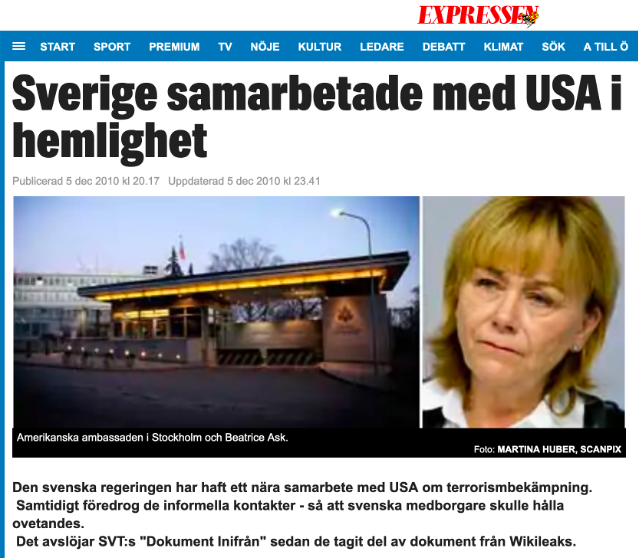
The heading in the image above, portraying the then (right-wing) Swedish Minister of Justice Beatrice Ask, reads in English: [47]
“Sweden cooperated in secret with US”
The report is from 5 December 2010, after the US had requested an action on Assange in August that year. The setup of the Assange case in Sweden took place nearly over, the same month.
(Expressen is a right-wing newspaper that has also campaigned against Assange).
The Assange case as conscientization tool in geopolitical propaganda
In this final text I am not referring –as in the previous section– about the using of the Assange case to further improve relationships in the striving for military trade, protection or other.
Here I describe the using of the Assange case aimed to foster alienation in the Swedish public, via NATO campaigners and other chauvinists that depict Russia as the threatening enemy Sweden. It aims, simply stated, to help making people Russophobe.
The strategy-design goes via these sequential steps:
- Insight on the flawed Rusophobe campaign
- Deformation and/or falsification of Assange’s character; and demonization of Assange as “enemy of Sweden”;
- Promoting an association with Russia of the obtained demonised gestalt of Assange. He and WikiLeaks presented as “Russian assets”;
- By further association, the Swedish organizations or individuals supporting the campaign for the Freedom of Assange are, ergo, maliciously labelled as also acting against the interest of Sweden.
1. Background. Failing to promote Russophobia based on alleged “constant Russian aggression in the Baltic”
In a society whose media communications are controlled by the state, or by a quasi-monopoly of corporations, or both –which is the case of Sweden– a “natural” correlation is expected to be established between variations in the public opinion and variations in the content of the medial message coordinated by publishing consensus.
The more space and frequency is given in the media for the agitation of the mantra “increasing dangerous situation in the Baltic occasioned by Russia”, the higher results in the polls about self-appraisals of “being worried about” are expected among the public.
However, the results I put together in the sequence below –a same poll done in 3 different occasions in a period of 17 months– show that the Swedish people has not become “more worry”, despite the alarmistic presentation of news on “Russians in the Baltic” during the period. The polls were ordered by Aftonbladet.
A poll expert commenting these results in Aftonbladet, concludes:
“The being-worried has not increased; it has decreased some, and remains stable” [48]
(The ‘being-worried’ in the survey refers to the statement ‘increasing military threat from Russia’, as suggested to the public by the media).
Meaning, worrisome headlines depicting over and over the so called Russian threat does not represent the people’s appraisal.
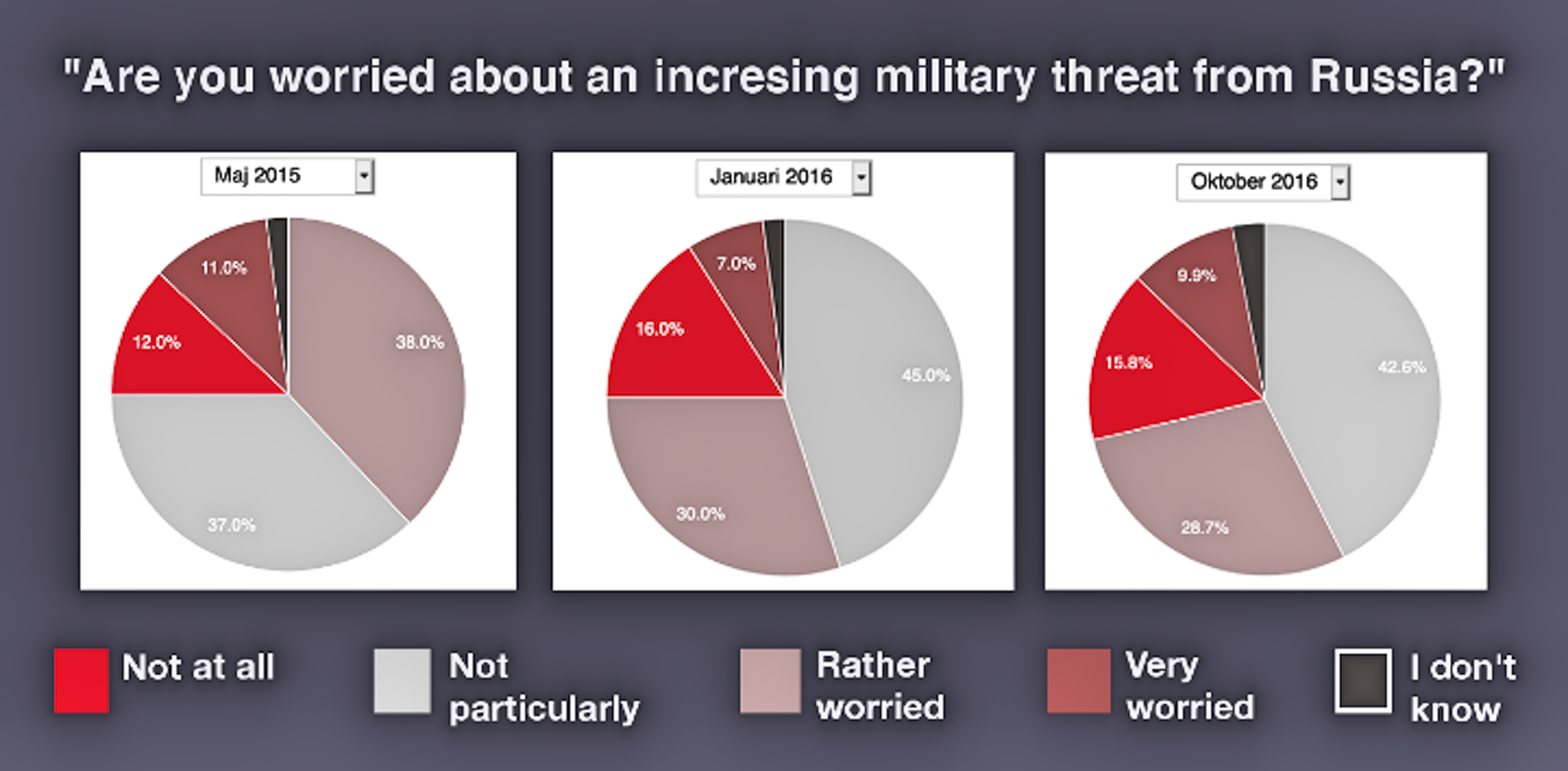
Failing to promote Russophobia among ordinary people via alarmist reports, false materials, news with omitted data, reports with deformed information, etc., the warmongering phalange resort to the use of symbolic icons –positive or negative– to attempt inducing conscientization by association.
Once they would have obtained the antipathy against Assange through lies about him and the ‘legal case’, they have intended to recycle the result of that libel, presenting Assange as a “Russian tool”.
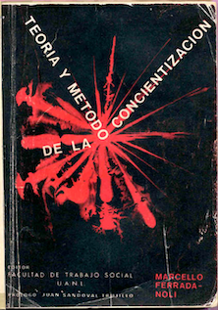 In my book “Teoría y Método de la Concientización” [49] I describe a resource used in pictorial art to call the attention of viewers, and which in its simplest form consist in alter dramatically the rhythm of the situation observed .
In my book “Teoría y Método de la Concientización” [49] I describe a resource used in pictorial art to call the attention of viewers, and which in its simplest form consist in alter dramatically the rhythm of the situation observed .
Like when a sailor has a placid sleep at night while the engines of the boat are running their monotone sound –but then the engines suddenly stop for some reason, and the sailor wakes up.
Or like when the same sailor is back on shore, and sleeping in house located in a quiet suburb. No noise disturbs his dreams –until a high speed motorcycle roar its passing by the street outside. Then he suddenly wakes up.
What makes us awake is not the noise, or the absence of it, but the sudden change in the environment we visit for a while, and get used to it.
People read and see so often in the news, reports about war atrocities, e.g. executions, that at the end it becomes ‘monotonous’ and may induce indifference.
That is why Goya and Manet, in their paintings “Fusilamientos del Tres de Mayo” (Goya, 1814), respectively “L’Exécution de Maximilien” (Manet, 1867), they severely transform elements of reality in order to ‘dramatically’ change that monotonous perception-rhythm in the viewers. These are then “woken up” and the intentional distortion makes them, subconsciously, focus on the message the artist has decided. Ergo, the public gets conscientized via a false presentation of reality –and grow insight (in that case, ethically justifiable) on the horrors of occupations wars. [Click on the images to enlarge].
 |
 |
In my opinion, that is exactly the propaganda resource which the pro-NATO media in Sweden –although with unethical aims– has indulged when they deformed, and continue to deform, the personality image of Julian Assange, the idiocyncratic image of Russia, the deformation of the geoplitics of other countries with are not in the esphere of NATO, the aliance commanded by the U.S.
But after all, we in Sweden are the Americas of Europe. Are we not?
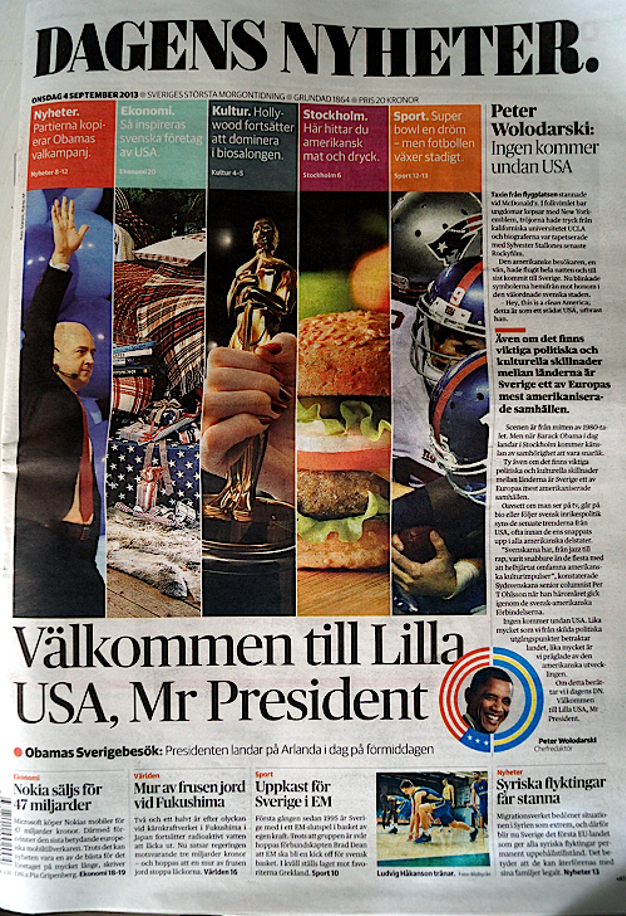
Headline above: “Welcome to little USA, Mr President”.
DN, 4 September 2013
DN’s editor in chief Peter Wolodarsky concluded in the first-page article, in a subheading:
“Sweden is one of the most Americanized countries in Europe”
It should be mentioned that the “leftist” among the Swedish political parties, Vänsterpartiet (the “Left Party”, formerly a communist party), also approved Carl Bildt’s proposition at the Swedish parliament of sending the Swedish Air Force to contribute in the bombing of Libya, under US command.
The “Left Party” also advocates for Syria the same warmongering stance than Hilary Clinton –meaning the establishment of a No-Fly Zone.
As a matter of fact, all Swedish parties, direct on indirectly, support the fundamentalist-jihadist opposition to the secular government of Assad.
Epilogue:
On the 19 May 2017, US Defence Secretary James Mattis declared that “USA would stand with Sweden if there was an attack.” [50] He said that on occasion of a visit to Washington by Swedish Defence Minister Hultqvist.
But perhaps when James Mattis talked to the Swedes about the US would come to help Sweden “if it was attacked”, the Americans were just putting an extra incentive to Sweden to get the Assange-case job done.
At that time, the possibility of extraditing Assange from Sweden was an option momentarily put on hold –when the case was (temporary) dropped on the 17 of May that year, amidst immense pressure from the judiciary and the public debate. It is quite likely that the visit of Defence Minister Hultqvist to Jimmy Mattis in Washington was aimed, among others, to examine that issue too.
Nonetheless, Mattis words were rapidly converted by the Swedish elites in a propaganda coup –deprived of the “would”. And in those terms the message was sent immediately to the public.
Expressen said (19 May 2917),
“US Defence Secretary James Mattis promise Sweden military help in case of a Russian attack” [51]
But no mention that Mattis’ message was formulated in conditional form –as he said, “the US would do it”. And they would do it” if”.
The information was spread by state-owned Swedish Radio, which solely did embed a broadcasted interview the views of “Anna Wieslander, of the Atlantic Committee” –the words with she was introduced in the initial presentation, together with characterizing it as solely being “an organization that wants to strength the Atlantic ties”.
However, behind that innocuous introduction there exist the fact –concealed to the Swedish public by the Swedish Radio– that Wieslander is actually “Director for Northern Europe at the Atlantic Council and Secretary General of the Swedish Defence Association”, and that “Atlantic Committee” is in fact The Swedish Atlantic Council, which is a member of NATO, based in Brussels.
Moreover, the Board of Directors of Swedish Atlantic Committee is composed to the half of Swedish Ambassadors and directors employed at Swedish Armed Forces related institutions. [51]
Notes and References
[32] Swedish Institute for International Affairs. “Ryssland” [In Swedish]. Retrieved 16 December 2019.
Original text [Swedish]:
“Äldre historia –De första statsbildningarna på det som senare blev ryskt territorium uppstod på 1000-talet f Kr i Centralasien, i Kaukasien och vid Svarta havet. På 850-talet e Kr grundades den östslaviska Kievstaten, och i Novgorod (Holmgård) bildade svenska vikingar under Rurik ett annat maktcentrum (Gårdarike). Sedan även Kiev hamnat under Rurikätten växte riket, och i slutet av 900-talet kristnades det av missionärer från Bysans (Östrom). Det försvagades och splittrades dock till följd av maktkamper och invaderades vid 1200-talets mitt av mongoler, som gjorde de ryska furstarna till vasaller under Gyllene hordens khaner.”
[33] Comments corresponding to each war are excerpts from Wikipedia.
[34] Svt nyheter, “Wikileaks: Bildt anser Sverige borde bli stormakt”, 27 February 2012.
[35] “Löfven: ‘SD är ett nyfascistiskt parti’”, updated 22 Agust 2016.
[36] Expressen,
“Löfven står fast: SD nyfascistiskt“, 10 April 2015.
[37] “Man måste gå tillbaka till vad det försämrade säkerhetsläget handlar om. Det är det ryska agerandet, en illegal annektering av Krim, operationer i östra Ukraina.”
In: Newsner, “New survey shows 7 out of 10 Swedes feel worry about Russia” (“Ny undersökning visar – 7 av 10 svenskar känner oro för Ryssland”), 18 January 2017.
[38] The exact formulation ”de stackars negrerna annars skulle stå utan jobb” is found in the Aftonbladet article by Åsa Linderborg, “No moderates at Mandela’s funeral. This is why Bildt and Reinfeldt staying at home” [“Inga moderater på Mandelas begravning – Därför ska Bildt & Reinfeldt stanna hemma”]. Aftonbladet, 6 Dec 2013.
[39] M Ferrada de Noli, “ ‘A nigger is a nigger and a Swede is a Swede’. Top leaders of Sweden’s second largest party stating position on Mandela’s struggle against apartheid”. The Professors’ Blog, 8 December 2013.
[40] M Ferrada de Noli, “ ‘A Swede is a Swede and a Jew is a Jew’, says Carl Bildt”. The Professors’ Blog, 10 December 2013.
[41] DN, “Jag har alltid varit stolt över ryktet att vara antisovjetisk”, 16 Abril 2014. The exact formulation of Bildt was: “I have a strong reputation of being anti-Soviet. I have always been proud about it”.
[42] Dagens PS, “SVT: Svenska FRA hackar datorer åt USA”, 11 December 2013.
[43] Svt Nyheter,
“FRA:s USA-samarbete oroar konfliktforskaren Agrell”, 11 December 2011.
[44] Aftonbladet, “’Det tyder på fartblindhet’, 11 December 2011.
[45] NATO, “Collective defence – Article 5”, updated 25 November 2019.
[46] The Local (Sweden), “US Defence Secretary Mattis warned Sweden not to sign anti-nuclear weapons treaty: report”, 30 August 2017.
[47] Expressen, “Sverige samarbetade med USA i hemlighet”, 5 December 2910.
[48] Aftonbladet, “Så räda är svenkarna för ryssen”, 30 October 2016.
[49] M Ferrada de Noli, “Teoría y Método de la Concientización”. Edit. Universidad Autónoma de Nuevo León, Monterrey, México. Segunda ed., 1972.
[50] Radio Sweden [State-owned]. “Why America wants to be allies with Sweden”, 17 May 2017.
[51] “USA:s försvarsminister James Mattis lovar Sverige militär hjälp i händelse av ett ryskt angrepp.” In Expressen, 19 May 2917.
Parts in this text are taken from the book “Sweden’s Geopolitical Case Against Assange 2010-2019“. Marcello Ferrada de Noli ©Libertarian Books, Sweden, 2020.
